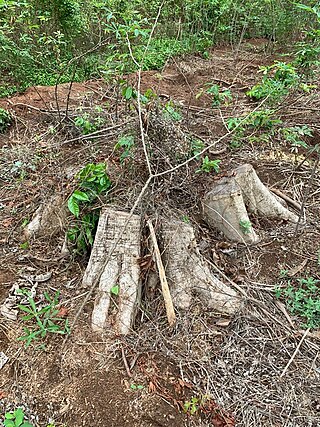
Deforestation or forest clearance is the removal and destruction of a forest or stand of trees from land that is then converted to non-forest use. Deforestation can involve conversion of forest land to farms, ranches, or urban use. About 31% of Earth's land surface is covered by forests at present. This is one-third less than the forest cover before the expansion of agriculture, with half of that loss occurring in the last century. Between 15 million to 18 million hectares of forest, an area the size of Bangladesh, are destroyed every year. On average 2,400 trees are cut down each minute. Estimates vary widely as to the extent of deforestation in the tropics. In 2019, nearly a third of the overall tree cover loss, or 3.8 million hectares, occurred within humid tropical primary forests. These are areas of mature rainforest that are especially important for biodiversity and carbon storage.

Greenpeace is an independent global campaigning network, founded in Canada in 1971 by a group of environmental activists. Greenpeace states its goal is to "ensure the ability of the Earth to nurture life in all its diversity" and focuses its campaigning on worldwide issues such as climate change, deforestation, overfishing, commercial whaling, genetic engineering, anti-war and anti-nuclear issues. It uses direct action, advocacy, research, and ecotage to achieve its goals.

Alliance 90/The Greens, often simply referred to as the Greens, is a green political party in Germany. It was formed in 1993 by the merger of The Greens and Alliance 90. The Greens had itself merged with the East German Green Party after German reunification in 1990.

Environmental degradation is the deterioration of the environment through depletion of resources such as quality of air, water and soil; the destruction of ecosystems; habitat destruction; the extinction of wildlife; and pollution. It is defined as any change or disturbance to the environment perceived to be deleterious or undesirable. The environmental degradation process amplifies the impact of environmental issues which leave lasting impacts on the environment.

Sustainable forest management (SFM) is the management of forests according to the principles of sustainable development. Sustainable forest management must keep a balance between the three main pillars: ecological, economic and socio-cultural. The goal of sustainable forestry is to allow for a balance to be found between making use of trees while maintaining natural patterns of disturbance and regeneration. The forestry industry mitigates climate change by boosting carbon storage in growing trees and soils and improving the sustainable supply of renewable raw materials via sustainable forest management.
The International Institute for Environment and Development (IIED) is an independent policy research institute whose stated mission is to "build a fairer, more sustainable world, using evidence, action and influence in partnership with others." Its director is Dr Tom Mitchell.

Brazil once had the highest deforestation rate in the world and in 2005 still had the largest area of forest removed annually. Since 1970, over 700,000 square kilometres (270,000 sq mi) of the Amazon rainforest have been destroyed. In 2001, the Amazon was approximately 5,400,000 square kilometres (2,100,000 sq mi), which is only 87% of the Amazon's original size. According to official data, about 729,000 km² have already been deforested in the Amazon biome, which corresponds to 17% of the total. 300,000 km² have been deforested in the last 20 years.

Deforestation in Nigeria refers to the extensive and rapid clearing of forests within the borders of Nigeria. This environmental issue has significant impacts on both local and global scales.

Climate Action Network - International (CAN) is a global network of over 1,300 environmental non-governmental organisations in over 130 countries working to promote government and individual action to limit human-induced climate change to ecologically sustainable levels.

The Amazon rainforest, spanning an area of 3,000,000 km2, is the world's largest rainforest. It encompasses the largest and most biodiverse tropical rainforest on the planet, representing over half of all rainforests. The Amazon region includes the territories of nine nations, with Brazil containing the majority (60%), followed by Peru (13%), Colombia (10%), and smaller portions in Venezuela, Ecuador, Bolivia, Guyana, Suriname, and French Guiana.
Environmental politics designate both the politics about the environment and an academic field of study focused on three core components:

Deforestation in Indonesia involves the long-term loss of forests and foliage across much of the country; it has had massive environmental and social impacts. Indonesia is home to some of the most biologically diverse forests in the world and ranks third in number of species behind Brazil and the Democratic Republic of Congo.

The World Resources Institute (WRI) is a global research non-profit organization established in 1982 with funding from the MacArthur Foundation under the leadership of James Gustave Speth. Subsequent presidents include Jonathan Lash, Andrew D. Steer and current president Ani Dasgupta (2021-).

Deforestation is a primary contributor to climate change, and climate change affects the health of forests. Land use change, especially in the form of deforestation, is the second largest source of carbon dioxide emissions from human activities, after the burning of fossil fuels. Greenhouse gases are emitted from deforestation during the burning of forest biomass and decomposition of remaining plant material and soil carbon. Global models and national greenhouse gas inventories give similar results for deforestation emissions. As of 2019, deforestation is responsible for about 11% of global greenhouse gas emissions. Carbon emissions from tropical deforestation are accelerating.
E3G is a climate change think tank operating to accelerate a global transition to a low-carbon future. The organisation has staff based in Brussels, Berlin, London and Washington, D.C..

Imazon is a non-profit organisation based in Belém, Pará, Brazil, that is dedicated to conserving the Amazon rainforest. It has published many reports on aspects of conserving the Amazon environment, has had a significant impact on environmental policy in Brazil, and has developed tools through which deforestation may be viewed online.

Annalena Charlotte Alma Baerbock is a German politician of the Alliance 90/The Greens party serving as Germany's minister for foreign affairs since 2021.

The 2021 United Nations Climate Change Conference, more commonly referred to as COP26, was the 26th United Nations Climate Change conference, held at the SEC Centre in Glasgow, Scotland, United Kingdom, from 31 October to 13 November 2021. The president of the conference was UK cabinet minister Alok Sharma. Delayed for a year due to the COVID-19 pandemic, it was the 26th Conference of the Parties (COP) to the United Nations Framework Convention on Climate Change (UNFCCC), the third meeting of the parties to the 2015 Paris Agreement, and the 16th meeting of the parties to the Kyoto Protocol (CMP16).
The international conference Petersberg Climate Dialogue is a series of negotiations to prepare the yearly UN Climate Change Conferences in spring or summer time between the COP conferences. The appointed next COP-president with his delegation usually is the co-host of PCD.
Navroz K Dubash is a professor at the Centre for Policy Research (CPR). He works on climate change policy and governance, the political economy of energy and water, and the regulatory state in the developing world. Widely published in these areas, Navroz serves on the Intergovernmental Panel on Climate Change as a Chapter Lead Author, Government of India advisory committees on climate change, energy and water policy, and the editorial boards of several international journals.















